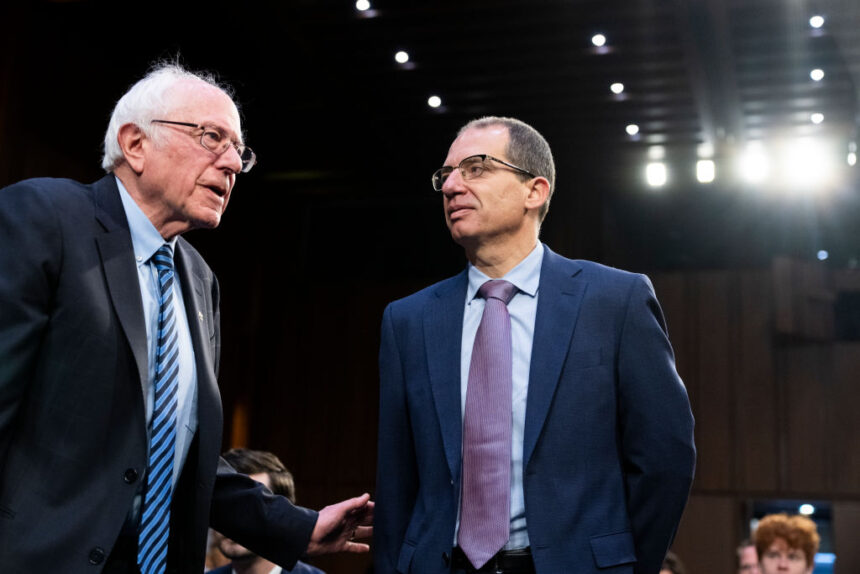Moderna CEO Stéphane Bancel was in the hot seat Wednesday as members of the Senate Health, Education, Labor and Pensions (HELP) Committee peppered the pharma leader with questions about the company’s considered price hike for its COVID-19 vaccine.
Last month, Sen. Bernie Sanders, (I-Vt.), chair of the HELP Committee, invited Bancel to testify as the company reportedly considered hiking the price of the vaccine to between $110 to $130 per dose.
This led to widespread criticism due to the fact that Moderna received federal funding as part of Operation Warp Speed, unlike Pfizer. Some senators joined Sanders in accusing Bancel and the pharma of profiteering off the pandemic at the expense of taxpayers.
Though the company promised Americans would not have to pay for the vaccine, the hearing came one day after Moderna president Stephen Hoge said the company expects to raise the price of Spikevax to $130 a dose once the federal government’s stockpile runs out.
The hearing was highly anticipated and marked another major development in the pharmaceutical industry’s relationship with federal lawmakers.
Below are four key takeaways from the hearing.
1. Sanders hammers Bancel on federal contributions to vaccine development
Sanders started off the hearing by echoing previous grievances with Big Pharma, noting that there is an “unprecedented level of corporate greed” in the industry, adding that it is “certainly true with Moderna.”
He noted that Moderna received billions in federal funding from the National Institutes of Health (NIH) to develop Spikevax, which he added can be manufactured at $3 per dose. Bancel said Moderna has “agreed to disagree” on NIH coinventorship as it relates to the vaccine.
Sanders also led the charge in questioning Bancel about the company’s patient assistance programs, which will be established after the federal government’s public health emergency lapses in May and is expected to cover the costs facing uninsured patients amid the price hike.
“The bad news is that most patient assistance programs are poorly designed and extremely difficult,” Sanders said. “I will be asking Mr. Bancel to make certain that this patient assistance program is simple, nonbureaucratic and in fact gets out to the people.”
Several other senators joined Sanders in expressing their concerns about the prospects of patient assistance programs meeting the logistical expectations posed by a higher vaccine price.
2. Bancel says decisions based on changing pandemic forecast
Repeatedly, Bancel said the price of Spikevax is related to its value, not the performance of the company’s stock.
He also pointed out that as the COVID-19 pandemic continues into its endemicity phase, the company has to adjust to changing demands for the vaccine.
“The volume we had during the pandemic gave us economies of scale that we won’t have anymore,” Bancel said. “That is why [the price] is different.”
The company said as much about the expected plunge in vaccine demand in its latest earnings report in February, when Moderna recorded revenues of $19.3 billion and a net income of $8.4 billion in 2022. As part of the quarterly release, Moderna said it expects Spikevax to generate $5 billion in sales in 2023, adding that there are plans to boost research and development investments to $4.5 billion.
Looking ahead at an uncertain future, Sanders asked directly if the U.S. would continue to pay more for Spikevax compared to the international community, to which Bancel said “I cannot say the price will be lower than in other countries.”
3. Capitalism versus socialism in pharma
Beyond the specific focus on Moderna’s business practices, the hearing also offered a more existential debate about the dueling dynamis between capitalism and socialism in the sector.
Last week, Moderna released a company financial report that noted Bancel brought home $19.4 million in total compensation in 2022, marking a $1.2 million increase compared to 2021. Bancel’s personal net worth is estimated at $5.52 billion.
Sanders said that Moderna’s leaders have prioritized profits over medical research.
Additionally, in a testy exchange over the “complexity” surrounding Moderna’s volume challenges, Sanders pressed Bancel about the company’s stock buybacks from last year which totaled $3.3 billion.
He implored Bancel to develop a counterculture focused on developing medicines as opposed to profits, invoking the name of Jonas Salk, the inventor of the polio vaccine who famously didn’t patent the treatment afterwards.
Sen. Bill Cassidy, (R-La.), ranking member of the HELP Committee, said that while it is fair to criticize Moderna, he didn’t want the hearing to deter biotechs from making future investments in innovation and manufacturing in the U.S.
Additionally, Sen. Mitt Romney, (R-Utah), came out in defense of investing in life sciences startups like Moderna, noting that vilifying the company may make others apprehensive about partnering with the federal government going forward.
In response to a question from Romney about Moderna’s drug development pipeline, Bancel highlighted the Breakthrough Therapy Designation earned by mRNA-4157/V940, its investigational cancer vaccine, in combination with Merck’s Keytruda for treating patients with high-risk melanoma.
4. Industry groups, stakeholders weigh in
The two-hour hearing drew significant attention from interested parties watching on.
The AIDS Healthcare Foundation praised Sanders for “holding” Bancel “to account for vax profiteering,” while the Campaign for Sustainable Rx Pricing (CSRxP) said the proposed price hikes represent a “brazen attempt by Big Pharma to price gouge patients and the U.S. healthcare system.”
“The price hike is even more egregious considering the vaccine was developed with significant taxpayer investment and that taxpayers have already paid billions of dollars to acquire the medication from Moderna through U.S. government purchases,” CSRxP executive director Lauren Aronson said in a statement.
For his part, Brad Loncar, a biotech investor and CEO of Loncar Investments, said the hearing was “actually refreshing,” noting that Moderna’s success is a testament to the ability of free enterprise in the healthcare industry.
He added that the goal of the Democratic senators on the HELP committee was to “minimize the work of” biotech companies and “demonize them.”







